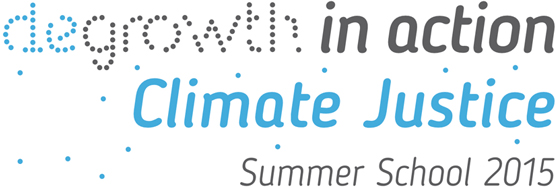Version 1.0
10. Ernährungssouveränität statt "Grünem Wachstum"!
Food sovereignty instead of "green growth"!

In diesem Kurs nehmen wir die von der Wirtschaft und internationalen Institutionen vorgeschlagenen Klimalösungen unter die Lupe, die ein „Weiter wie bisher“ ermöglichen. Wir schauen uns die Funktionsweise und die Auswirkungen von Instrumenten wie Clean Development Mechanism (CDM) und Climate Smart Agriculture auf die bäuerliche Landwirtschaft und auf das Klima an. Danach diskutieren wir die Konzepte der Ernährungssouveränität und der Agrarökologie als theoretische und praktische Gegenmodelle. Im zweiten Teil des Kurses eignen wir uns aktivistisches Handwerkszeug an, um am Camp und darüber hinaus mit kreativen agrarpolitischen Aktionen in Erscheinung treten zu können. Der Kurs wird zweisprachig (Deutsch und Englisch) angeboten.
In this course we look at climate solutions which have been suggested by the economy and international institutions and allow for "business as usual". We assess the functioning and impact of instruments such as the Clean Development Mechanism (CDM) and Climate Smart Agriculture on small-scale peasant agriculture and climate. Moreover, we discuss the concepts of 'food sovereignty' and 'agro-ecology' as theoretical as well as practical counter-models. In the second part of the course we acquire activist tools in order to put into effect creative agro-political actions at the camp and beyond. The course will be offered in English and German.
Die Art wie wir landwirtschaften spielt eine tiefgreifende Rolle bei der Gestaltung unserer Zukunft. Was wird die wachsende Zahl der Weltbevölkerung essen, wo und wie wird sie leben? Die industrielle Nahrungsmittelproduktion ist für annähernd die Hälfte des globalen Treibhausgasausstoßes verantwortlich, gleichzeitig wird die bäuerliche Landwirtschaft, die bis heute die Welt ernährt, vom Klimawandel bedroht. Beim UN-Klimagipfel laufen die diskutierten Lösungen jedoch allzu oft auf technokratische, marktbasierte Mechanismen hinaus. Das tragende Prinzip dieses „Klimaablasshandels“ erstreckt sich mittlerweile auch immer mehr auf die Landwirtschaft. Exemplarisch wollen wir einige vermeintliche Klimaschutzinstrumente behandeln und ihre Auswirkungen auf die Landwirtschaft und das Klima untersuchen. Als theoretische und gelebte Gegenmodelle möchten wir im Anschluss die Konzepte der Ernährungssouveränität und der Agrarökologie vorstellen. Zusammen bieten sie substantielle Lösungsvorschläge, denn sie erkennen die Forderung nach einem demokratischen, zukunftsträchtigen und gerechten Landwirtschafts- und Ernährungssystem als eng verknüpft mit sozialen und ökonomischen Verhältnissen. Während der zweiten Hälfte des Kurses werden wir uns unter Anleitung von „Vredesactie“ mit unseren kollektiven Handlungsspielräumen beschäftigen. Neben theoretischem Input über Aktionsformen und taktische Konzepte werden wir konkrete Aktionen planen, mit denen wir am Klimacamp und darüber hinaus in Erscheinung treten können. Im Kurs werden wir mit verschiedenen interaktiven Methoden arbeiten, u. a. Diskussionen, Brainstorming, Fishbowl, hassle line und Methoden zum Teambuilding.
The way in which we do agriculture plays a fundamental role for the design of our future. What will a growing number of the world's population eat, where and how will they live? The industrial food production is responsible for almsot half of global green house gas emissions. At the same time, peasant agriculture, which feeds the world until today, is threatened by climate change. At the UN climate summit most of the discussed solutions lead to technocratic and market-based mechanisms. Meanwhile, the guiding principle of this 'sale of indulgences' also increasingly extends to agriculture. Exemplarily, we want to assess some of the supposed climate protection instruments and their impact on agriculture as well as climate. Subsequently, we would like to present the concepts of 'food sovereignty' and 'agro-ecology' as theoretical and practical counter-models. Together they offer substantial proposals for solution because they acknowledge the close connection between the demand for a democratic seminal and just agricultural and food system and the social and economic conditions. In the second part of the course we engage with our collective rooms for manoeuvre under the guidance of „Vredesactie“ (a pluralistic organisation which is concerned with non-violent conflict solution strategies for society and aims to empower people to defend themselves in a non-violent way). Along with a theoretical input on different forms of action and tactic concepts we will plan concrete actions which we can carry out at the climate camp and beyond. During the course we will work with different interactive methods such as discussions, brainstorming, Fishbowl, hassle line and methods for team building.
Info
Raum:
Tent/Zelt 6
Track:
Courses/Kurse
Sprache:
De
Verfügbare Sprachen:
Englisch
Links:
Feedback
Referent_innen
 |
Iris Frey |
 |
Paula Gioia |
